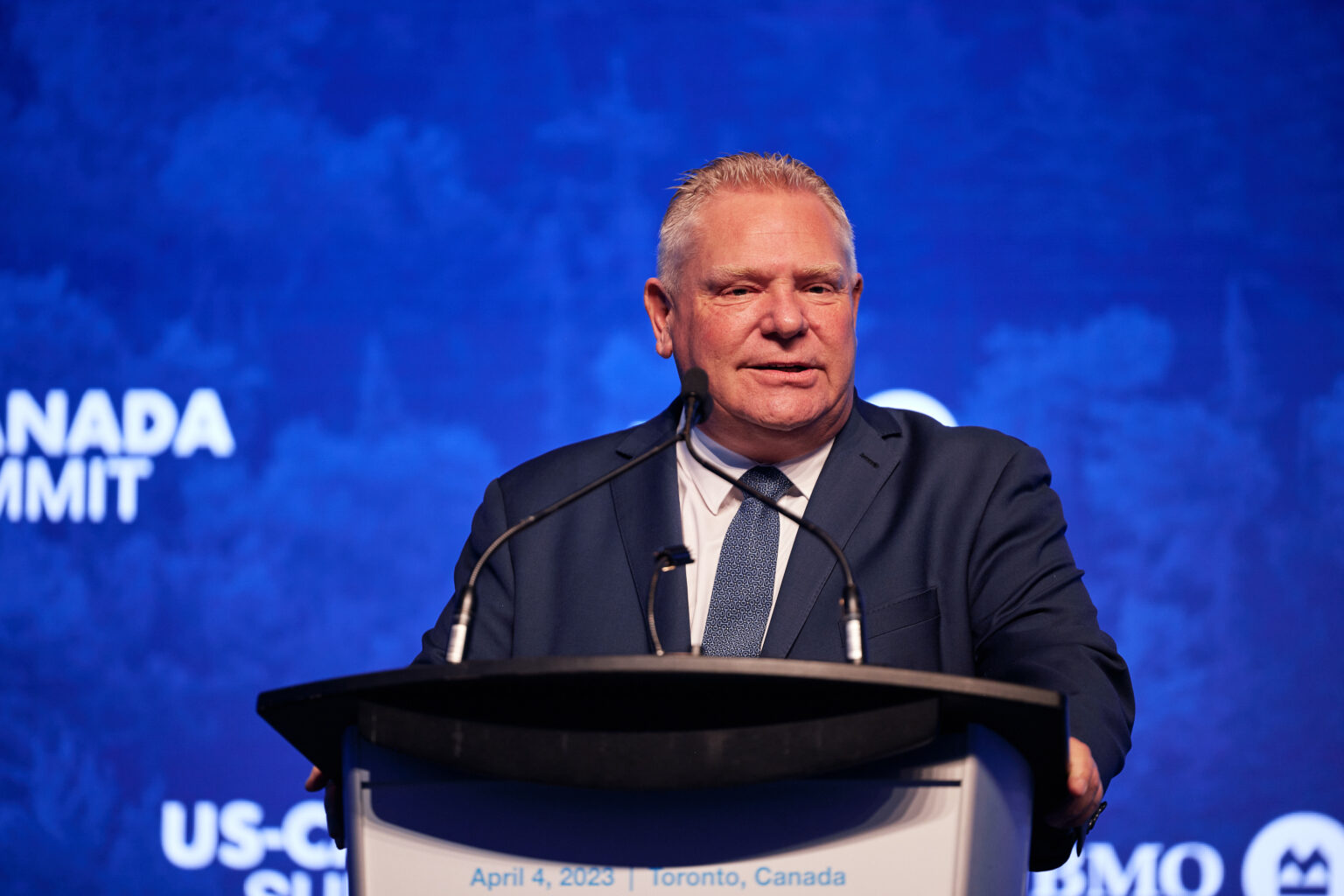As Donald Trump’s unjust trade war with Canada heats up, Canadian politicians are advocating less economic dependence on energy exports to the United States. But environmentalists are pointing out that Ontario premier Doug Ford — who has championed electricity surcharges on exports to the U.S. — is chiefly responsible for increasing the Canadian province’s dependency on American fossil fuel imports.
Ford was one of the first politicians in Canada to advocate using surcharges on electricity as a “counter-tariff” measure in response to tariffs imposed by the Trump administration. Though it at first seemed like Ford was going ahead with a 25 percent surcharge on electricity exports to the United States, he relented after a call with U.S. Commerce Secretary Howard Lutnick, agreeing to fly to Washington D.C. to discuss the matter in person with Trump administration officials. White House press secretary Karoline Leavitt described Ford’s counter-tariff as “egregious and insulting” and that it justified Trump’s additional 25 percent tariff on steel and aluminum imports from Canada.
The trade war has highlighted a considerable vulnerability in the Canadian economy: an over-reliance on an American market for Canadian energy exports and imports, be they fossil fuels or direct electricity transfers. The interconnectedness of the two nations’ economies is demonstrated by the example of Ontario, which exports electricity to the American states of New York, Michigan, and Minnesota, while importing fracked gas from Ohio and Pennsylvania.
The Ontario Clean Air Alliance (OCAA), a longtime critic of the Ford government’s environmental policies, has been sounding the alarm recently, noting Ford is chiefly responsible for making Ontario more vulnerable by increasing its dependence on American fracked gas imports for home heating and electricity. In fact, the Ford government is seeking to increase Ontario’s dependence on natural gas, despite the obvious and considerable environmental and economic consequences. The premier’s recent re-election campaign advocated an expansion of gas plants most Ontarians don’t actually want.
“For security, economic and environmental reasons, Ontario needs to get off gas,” said Aliénor Rougeot, senior climate and energy program manager with Environmental Defence.
“The problem is that government policies over the last few years have made us more dependent on it. Since 2018, Ontario has tripled its use of gas plants to produce electricity, and the province plans on increasing our use of gas until it makes up a quarter of our electricity mix by 2030.”
This is confirmed by the OCAA, which further notes that use of gas for electricity was only 4 percent in 2017, the year before Ford took office.
Renewable Projects Cancelled
Despite Doug Ford’s effort to rebrand himself as “Captain Canada” in the trade war, it was Ford who made Ontario’s economy more vulnerable by cancelling nearly 800 renewable energy contracts shortly after taking office in 2018.
“The American president’s recent economic attack on Canada has exposed just how dangerous our economic dependence on the U.S. is,” said Rougeot in a statement to DeSmog.
“One of the ways Canadians have risen to the occasion is by boycotting U.S. products and focusing on buying Canadian,” said Rougeot.
“But despite our efforts, there is one American product that is forced on Ontarians every day: fracked gas. Over the last seven years, Premier Ford’s policies have made Ontarian homes and businesses more dependent on U.S. gas — despite the availability of cheaper alternatives.”
Despite threats of annexation and tariffs beginning in late 2024, Ford’s 2025 electoral campaign also supported the expansion of gas in Ontario. Enbridge, a pipeline and fossil fuel company based in Calgary that has been given exclusive rights to expand Ontario’s gas dependency by the Ford administration, has recently indicated gas prices in Ontario may surge by 25 percent. Ford even intervened and overruled a decision by the Ontario Energy Board in 2024 that would have made Enbridge pay for gas pipeline expansion to new housing; Ford decided in Enbridge’s favour.
“The question of whose interests are being served by doubling down on gas was clear in December 2023 when it took less than 24 hours for the Ford government to announce they’d take the unprecedented step of passing legislation to overrule the Ontario Energy Board’s landmark ruling that electrically-powered heat pumps were a better economic and environmental option than gas furnaces for new homes,” said Keith Stewart, senior energy strategist with Greenpeace Canada.
“At the time, this represented a massive win for Enbridge gas and a loss for consumers and the environment,” said Stewart in a statement to DeSmog. “But in light of the Trump-launched trade war we are now seeing that it has also left us with greater insecurity of supply.”
“Seventy percent of the gas Ontario used in 2023 was imported from Pennsylvania and Ohio,” said Environmental Defence’s Rougeot. “This means many of our homes, buildings and factories depend on trade with the U.S. This is problematic: relying on U.S. gas makes Ontario vulnerable to the U.S. withholding some of it, for example, in response to some of our government’s threats to limit our electricity exports to them. It also undermines our ability to inflict economic pain on the U.S. in retaliation to the tariffs. Importing American gas is a weakness for Ontarians, and now is not the time to show weakness to our southern neighbour.”
Rougeot also notes that the gas Ontario is importing is fracked gas, a particularly potent fossil fuel. The fracking process releases large volumes of methane, which is over 80 times more potent than CO2 over 20 years.
“These fugitive methane emissions are supercharging climate warming,” said Rougeot.
Not only has Ford increased Ontario’s economic vulnerability as much as further entrenching the province in a climate-killing fossil fuel, Ford has further undermined the efforts to increase the use of sustainable renewable energy.
“Spending time and resources expanding the natural gas network in Ontario is a waste of public money that could otherwise be used to fund renewable energy that would provide affordable, reliable, clean electricity to people living in Ontario that is made in Ontario, said Stephen Thomas, clean energy manager with the David Suzuki Foundation.
“When it comes to heating and cooling our homes, high-efficiency heat pumps are available at scale, they will save households money, they are healthier, and they are more that twice as efficient as burning fossil fuels in our homes,” said Thomas in a statement to DeSmog.
Thomas further notes that Ford’s doubling down on gas isn’t a smart economic policy, not only because of the dependency on U.S. imports, but because of gas’ cost.
“Renewables like wind and solar are the cheapest forms of electricity in history — cheaper than gas, cheaper than nuclear, and cheaper than all other sources of electricity,” said Thomas. “Pairing low-cost renewables with energy storage and grid upgrades provide cheaper electricity with more benefits to people and the grid.”
Path to Energy Security
Research provided by the David Suzuki Foundation demonstrates that there is a clear path to affordable, reliable, zero-emissions electricity throughout Canada by 2035. The research demonstrates lower energy costs for households, as natural gas for heating buildings is phased out while households switch to electric heat pumps and other energy efficiency solutions.
To justify the Ford government’s retrograde environmental and economic policies, they have frequently misled the public with statements questioning the viability of renewable energy systems to contend with current and future energy needs, says Rougeot. For example, Ontario Energy Minister Todd Smith has described wind and solar energy systems as “intermittent,” despite reporting from DeSmog and others on the think tanks shaping these reliability claims.
“The main reason the government has given for ramping up the use of gas-powered plants and building new ones is that they expect growing electricity needs, and that’s also why some nuclear plants are being refurbished,” she said. While Rougeot accepts that electricity demand is indeed expected to grow, there’s no reason for the Ford administration to deliberately reject the cheapest and cleanest energy sources available to Ontarians: wind and solar.
“Importing American gas during a trade war undermines Ontario’s energy security and strengthens the U.S.’s leverage, and everyone should agree it is an emergency to reduce our dependence on it,” said Rougeot.
“Plus, burning gas for electricity and home heating is making people sick due to air pollution and putting our lives at risk by accelerating the climate crisis. It is time we get Ontario off gas for good.”
The health consequences of increased gas use in Ontario is poorly understood and rarely enters into discussions, but it has real-world economic implications that need to be included in government risk-benefit analyses.
“Ontario’s growing reliance on natural gas for heat and electricity is a dangerous step backward for public health and the climate,” said Dr. Mili Roy, ophthalmologist and chair of CAPE Ontario, the Ontario chapter of Canadian Association of Physicians for the Environment (CAPE).
“Gas-fired power plants release air pollutants that worsen asthma, heart disease, and other serious conditions — particularly in vulnerable populations like children and seniors. Expanding gas generation will also drive up healthcare costs, further straining an already burdened system, while locking us into decades of fossil fuel dependency that undermines our climate commitments,” said Dr. Roy in a statement to DeSmog.
“Ontario has the solutions — renewable energy, energy storage, and grid efficiency improvements — that can keep the lights and heat on without polluting the air we breathe and harming our health. The Ford government must stop locking Ontarians into fossil fuel dependency and instead invest in clean energy that protects our health, economy, and future.”
Subscribe to our newsletter
Stay up to date with DeSmog news and alerts







